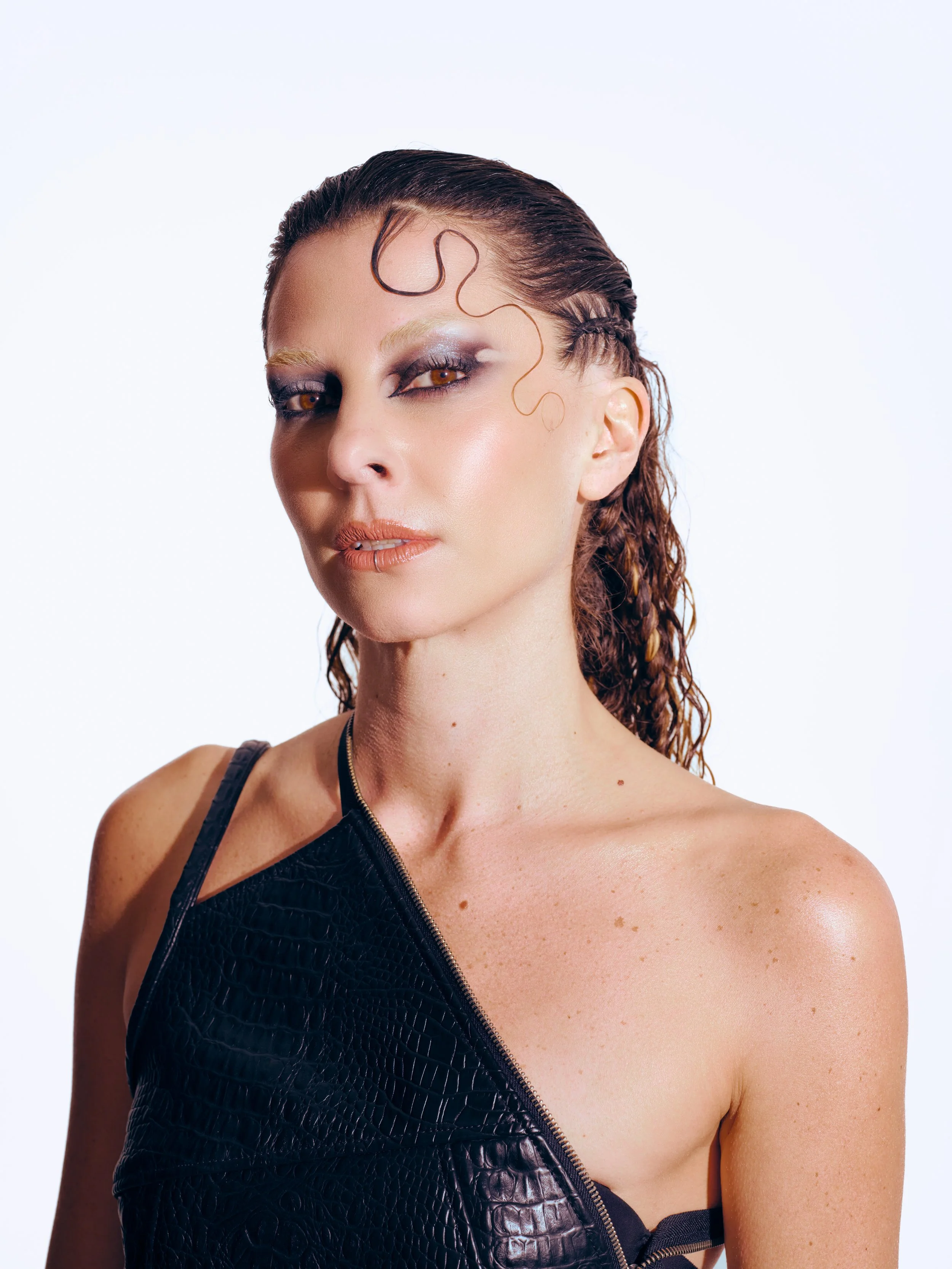IN CONVERSATION WITH BEC
Interview by Samo Šajn
BEC is a Berlin-based DJ, producer, and founder of the EMBARGO label. Known for her powerful techno sound and emotional depth. She’s also an advocate for queer representation and healing through plant medicine. In this interview, she shares her journey through music, transformation, and creating with purpose.
You’ve talked about the shift from queer visibility to queer resourcing. What does building real infrastructure for queer artists and creators look like to you?
Visibility is a great first step, but it’s not enough. Resourcing means putting power, money, and opportunities into queer hands, not just booking us for Pride month. That means queer-led labels, agencies, mentorship programs, funding, and safe spaces created by and for us. It also means giving queer artists ownership over their work, fair pay, and independence from traditional gatekeepers. Real infrastructure is about building from the ground up and supporting the community long-term.
Why is it important to have queer voices not only on stage but also behind the scenes as developers, engineers, and investors in the music industry?
Because that’s where the power lies. Being on stage is amazing, but if those making decisions don’t understand our lived experience, we’ll always hit a ceiling. When queer people are involved behind the scenes, we can shape the platforms and systems, not just exist within them. That’s how we stop depending on outside validation and start creating ecosystems where we can thrive on our own terms.
Your first experience with Bufo, a powerful psychedelic from the Colorado River toad, was a turning point in your journey. How did that shape your path, personally and musically?
I’ve questioned life since I was young, wondering why people accept certain systems without questioning them. That curiosity led me to more spiritual people as I traveled. In 2013, before heading to Burning Man, a friend invited me to a Bufo ceremony in LA. I said yes, and that moment changed my life.
It’s hard to describe a Bufo experience in words. It dissolves your sense of self. There’s no identity, no time, no body, just an overwhelming feeling of connection to something far greater. It gave me a deep sense of knowing that there’s a force beyond all of us, something intelligent and divine.
That moment showed me that I could surrender to life and trust my intuition. It helped me understand the patterns and fears I had been holding on to, and gave me the clarity to let go. That was the beginning of my healing journey.
Creatively, it changed everything. I started putting more energy into the studio, seeing music as a way to channel what I couldn’t express in words. I became more intentional and in tune. I realized music is frequency, and frequency is energy. It shapes what we feel.
Addiction as disconnection is a powerful concept. How have plant medicines and integration practices helped you reconnect and transform your relationship with music?
Addiction has been present in my life through family, friends, and at times, myself. I’ve learned that it’s not just about substances. It’s about disconnection from yourself, your body, and your emotions. Addiction shows up as the constant need to escape or numb, whether through substances, work, or stimulation.
Ayahuasca helped me understand the root of that disconnection. It strips away your coping mechanisms and forces you to face what’s underneath. The ceremonies are powerful, but the real work is in the integration. I integrate through journaling, meditation, movement, and giving myself time to feel.
Now, my relationship with music is different. I’m not creating to perform or prove something. I’m creating from presence. The process feels more honest and alive. It’s no longer about the outcome, it’s about expressing something real.
Your upcoming EP Dawn of a New Dimension feels like a bold evolution. What emotional or creative space were you in while producing it?
This EP came at a turning point. I was leaving a long-term relationship and letting go of creative patterns that no longer served me. I had spent years shaping tracks to fit certain labels and finally stopped. I let go of the pressure and just created for myself.
That’s when everything started to flow. More labels said yes. The music resonated differently. The track Dawn of a New Dimension came to me during a deep flow state. I finished it quickly, and that’s how I knew it was real. The title reflects the shift I felt, stepping into a new version of myself creatively and personally.
As a self-described studio geek, how do you fuse technical mastery with raw emotion in your tracks?
I love the technical side, from sound design to frequency shaping. But the emotion always comes first. I usually start with a feeling or atmosphere I want to capture. Then I use my technical knowledge to shape it.
It’s like being both the channel and the architect. I blend emotion with structure, intuition with precision. That’s where my best work comes from, when both parts are in harmony.
With EMBARGO, you’re curating more than just sound. You’re building a platform. What values guide your choices on what and who to release?
EMBARGO is about collaboration and quality over quantity. Just two or three releases a year. It’s not just about how good the track is, it’s about intention. I’m drawn to artists who push sonic boundaries and have a deeper purpose behind their work.
I care about originality, emotion, and whether the artist has something meaningful to say. Are they contributing to the culture? Do they have a vision? I also want to support underrepresented voices, especially queer artists and artists of color.
EMBARGO is a space for experimentation, integrity, and truth. It’s about uplifting artists who bring not just sound but perspective and energy.
You’ve been open about your healing journey. How has reclaiming your story impacted your connection with your audience and your purpose as an artist?
Sharing my story helps others feel less alone. For me, creativity is deeply connected to healing. When I’m in a reflective or emotional place, I create my most powerful work. Music helps me process.
My purpose has evolved. In the beginning, it was about dancing, performing, and connecting with people. Now it’s more about vulnerability and helping others through their own transformations.
Earlier this year, I mentored three artists and helped them link their creative process to their emotional state. Once they started facing their fears, their music improved. That’s what I want to keep doing, using music as a tool for growth, connection, and healing.



